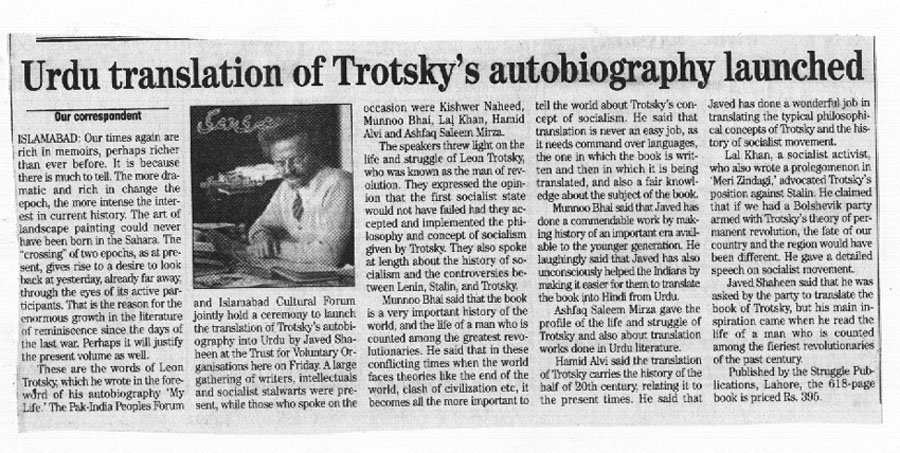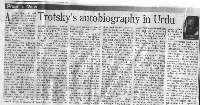Meri Zindagi
(Autobiography of Leon Trotsky)
Translated into Urdu by Javed Shaheen
Published by the Struggle Publications, Lahore
Price: Rs 395
Pages: 618
The man who is counted among the fieriest revolutionaries of the past century says he is rather 'pedantic and conservative' in his habits: "I like and appreciate discipline and system... I must add that I cannot endure disorder or destruction. I was always an accurate and diligent schoolboy, and I have preserved these two qualities all my life... A well-written book in which one can find new ideas, and a good pen with which to communicate one's own ideas to others, for me have always been and are today the most valuable and intimate products of culture".
Leon Trotsky wrote these lines in 1930 when he was approaching 50 and was living at Constantinople after having been kicked out of the Soviet Union by Stalin. The outside world as well as many of the Russians knew him as one of three who led the Bolshevik Revolution. At the time of Lenin's death in the third week of 1924, he was the commander in chief of the Red army in whose organisation he had played the pivotal role. He was widely expected to succeed Lenin. There are reasons to believe that Lenin himself desired Trotsky to take the reins of the revolutionary government he was leaving behind. Stalin, however, outfoxed him. Eventually he was expelled from the Communist party and made to leave Russian in 1929.
Constantinople turned out to be "one of the unforeseen, though not accidental, stops" in Trotsky's life. It was here that he wrote his memoirs that were published in 1930 under the title My Life. The book under review, Meri Zindagi, is the Urdu translation of Trotsky's autobiography. The translation has been made by Javed Shaheen who is chiefly known as a poet. Of late, he has also started writing fiction. Some of his stories have been published in literary journals and his maiden collection of stories is to hit the bookstands shortly. However Javed Shaheen's interest in translation is not new. Many years ago, he rendered Dale Carnegie's popular books into Urdu. So he can be taken as an old hand at translation. The present translation speaks volumes for his expertise in this field.
Meri Zindagi carries a prolegomenon by Lal Khan, the leftist intellectual I greatly admire. He has advocated Trotsky's position against Stalin. He claim that if we had a Bolshevik party armed with Trotsky's theory of permanent revolution, the fate of our country and the region would have been different.
The basic question that a reader may ask is whether the account of events given by Trotsky is reliable. My humble opinion in this regard is that men who make history are usually not good writers of history. They should not be expected to write 'true' or 'objective' history. They remain chained to their obsessions, dreams and nightmares. They are too involved in the events they write about to observe them clearly. Clarity demands detachment. Hence 'objective' history is written by professors who, away from the theatre of history-making events, write books in their study rooms.
Trotsky's version of the main events of his life is, however, largely dependable. The self-written story of his life brings him out as an unassuming man who is not given to boasting. For instance, and it is very important instance, a between-the-lines reading of his My Life makes it clear beyond doubt that he was only half willing to accept the responsibility of leading the revolutionary forces of Russia.
In many of his later books, including the three-volume tome -- The History of the Russian Revolution, Revolution Betrayed and Stalin: An Appraisal of the Man and His Influence -- he has painted Stalin as a Machiavellian tyrant who had turned against him with all his might. His autobiography, however, tells us a different story. According to his own account, he had left Moscow for a far-flung Sukhum when Lenin was lying on death bed. He did not care to keep himself in the capital city at that crucial time. On getting the news of Lenin's death on his way to Sukhum, he did not rush to Moscow but preferred to continue his journey to that God-forsaken small town where he was to spend many "long days lying on the balcony facing the see." So plain common sense can make us understand that he himself provided Stalin with the opportunity to outstrip him.
Anyway, the book is not all about Trotsky's fall. He has given a very interesting narrative of all the mentionable events unfolding in his very adventurous life. Even a thumbnail sketch of his activities does not fail to convince us that he lived an unusual life.
Born to a Ukrainian Jewish family in 1879, Trotsky was educated at the scientific school of Odessa. Before the completion of education, he got himself involved in trade union activities. He was arrested and later exiled to Siberia. However he escaped from there and somehow managed to reach London at the age of 23. It was in London that he came across Lenin and their life-long association began. Later he went to many European cities and tried to organise communist parties and groups there. During the next ten or twelve years he was imprisoned many a time and expelled from many countries. No European country was willing to welcome him during the first world war. So he went to the United States in 1917 and made many efforts to convince American leaders and public to keep their nation away from the war. He returned to Russia the same year.
Trotsky was driven out of Russia in 1925. He finally found refuge in Mexico in 1937 where he was welcomed by the leftist president General Cardenas. He was assassinated there in 1940 by one Jacques Mornard who was reported to be a Spanish communist.
My Life tells the story of this wonderfully unusual life. Read it now in Urdu, if you have not already read it.
Click on the thumbnail to view press reviews on Trotsky's My Life.
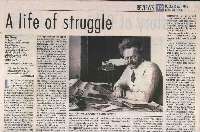 | 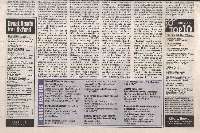 | 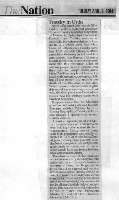 |
